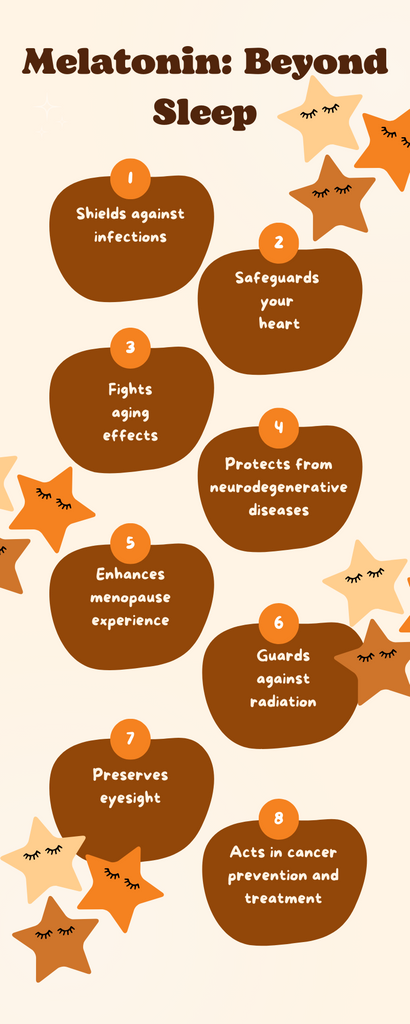Melatonin: Beyond Sleep – A Health Ally for Life
| February 22, 2024A Sneak Peek:
Even if you're a sound sleeper, everyone 40 and above should consider melatonin. Supported by 19 research papers, melatonin does more than aid sleep:
- Shields against infections
- Safeguards your heart
- Fights aging effects
- Protects from neurodegenerative diseases
- Enhances menopause experience
- Guards against radiation
- Preserves eyesight
- Acts in cancer prevention and treatment

Thinking about melatonin differently now? It's more than just a sleep aid; it's a health ally.
My Key Takeaway from an Informative Melatonin Article:
Dr. Frank Shallenberger, MD, HMD, FAAO, shared an insightful piece titled "Melatonin Isn’t Just for Sleeping – From Cardiovascular Disease and Cancer to Aging and Macular Degeneration the Research Will Shock You" in the February/March 2019 Edition of the Townsend Letter. This article reveals a crucial point: our melatonin production drops after 20 and takes a nosedive by 50. As hormones decline with age, melatonin steps up as a health superhero. Let me break down why melatonin is essential for a great quality of life, especially as we age.
Understanding Melatonin:
Melatonin, a hormone originating in the pineal gland during darkness and sleep, is not merely a sleep inducer. Its production is hindered by all colors except red, highlighting the importance of complete darkness during sleep. Dr. Shallenberger's research reveals that melatonin levels decline after the age of 20. Fortunately, melatonin supplements, with no side effects and without impeding natural production, can unlock a range of health benefits.
Infections:
Melatonin proves effective against bacterial and viral infections, including chlamydial and Mycobacterium tuberculosis-induced infections. It hampers bacterial reproduction, creates an inhospitable tissue environment, and reduces inflammation, making it a potent ally in infection control.
Heart Health:
Diminishing melatonin levels with age elevate the risks of coronary disease, high blood pressure, heart failure, and stroke. However, melatonin boasts impressive anti-inflammatory and antioxidant properties. Even a low dose of melatonin has shown potential in reducing blood pressure, showcasing its impact on heart health.
Neurodegenerative Issues:
In the aging nervous system, melatonin emerges as a key antioxidant, surpassing other supplements in safeguarding aging brain cells. It not only combats cognitive decline but also enhances neurogenesis, the process crucial for countering neurodegenerative diseases like Alzheimer's.
Menopause Support:
A study found that melatonin supplementation significantly reduced menopausal side effects in women. The positive impact on pituitary and thyroid functions suggests melatonin's potential in alleviating menopausal symptoms and promoting hormonal balance.
Radiation Protection:
Ionizing radiation, often from medical procedures like X-rays, contributes to cancer risk. Melatonin proves to be a simple preventive measure, as taking it before such procedures can eliminate negative effects. This finding underscores melatonin's potential protective role against radiation-induced harm.
Anti-Cancer Power:
Melatonin stands out as a powerful supplement for cancer prevention and treatment, activating the immune system against cancer cells while shielding healthy ones from chemotherapy and radiation. Studies show a remarkable 44% reduction in the risk of death for cancer patients using melatonin. Its anti-cancer mechanisms include triggering apoptosis, inhibiting telomerase, and thwarting angiogenesis.
Renowned researchers, Dr. Shallenberger and Russell Reiter, advocate nightly melatonin intake, maintaining vitality and mental sharpness even in their 80s. Personally, a nightly intake of 150-180 mg has alleviated fatigue and enhanced overall well-being since menopause at age 50.
In conclusion, melatonin proves to be more than just a sleep aid; it is a health ally that addresses a spectrum of issues ranging from infections and heart health to neurodegenerative diseases and cancer prevention. As melatonin levels decline with age, supplementation becomes crucial for unlocking its myriad health benefits and ensuring a high quality of life.
- Choosing a selection results in a full page refresh.
- Press the space key then arrow keys to make a selection.

